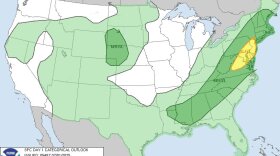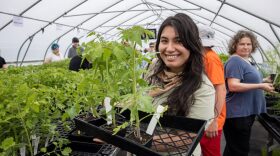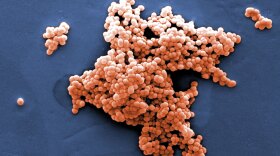-
Stephanie Sigafoos/LehighValleyNews.comUGI Utilities Inc. on Wednesday announced a smaller-than-expected increase in the purchased gas cost rate beginning Dec. 1.
-
Hayden Mitman/LehighValleyNews.comLehigh County Judge Thomas Caffrey said criminal dockets related to an interstate drug ring should have been unsealed weeks ago. LehighValleyLive.com, LehighValleyNews.com and The Morning Call had petitioned the court to release information pertaining to dozens of criminal defendants.
-
More than two years after the stabbing deaths of four University of Idaho students, the former Northampton Community College and DeSales University student pleaded guilty in a deal to avoid the death penalty.
-
The city is the third major city in the Lehigh Valley to become certified through Bird Town Pennsylvania, an annual designation focused on community-based conservation.
-
Despite not being approved for human consumption, veterinary tranquilizers are infiltrating the illicit drug supply in Pennsylvania. Harm reduction specialists and health care professionals say these overdoses can't be approached solely with naloxone, the opioid overdose reversal drug.
-
The bill would limit the manufacture, sale, distribution and use of firefighting foam containing PFAS, also known as forever chemicals, beginning in 2026.
-
President Donald Trump campaigned on immigration enforcement and recent U.S. Immigration and Customs Enforcement operations have gained national and local attention. This week on Political Pulse, host Tom Shortell and political scientist Chris Borick look into the public's reaction to these raids.
-
After Monday brought rounds of thunderstorms and heavy rain, more severe weather is expected to target the region on Tuesday, forecasters say.
-
Xylazine, an animal-grade tranquilizer that's not approved for human use, has taken Pennsylvania's illicit drug supply by storm. Known on the streets as "tranq," it accounted for almost 1 in 4 overdose deaths in Pennsylvania by 2023. Last year in Lehigh County, it was a contributing cause of death in 20 of the 112 deadly overdoses, or 17.9 percent of cases.
-
Multiple media outlets report Bryan Kohberger has agreed to plead guilty to murdering four University of Idaho students as part of a deal with prosecutors to avoid the death penalty. A change of plea hearing is set for Wednesday. Kohberger’s trial had been set to begin in August
-
The funding comes from the commonwealth’s Resilient Food Systems Infrastructure program, a cooperative agreement with the U.S. Department of Agriculture.
-
Known as "tranq" on the streets, an animal tranquilizer named xylazine infiltrated drug supplies throughout Pennsylvania since 2019. Its presence in the Lehigh Valley has grown, with deadly consequences.
-
The administrative branch of the National Football League is tax-exempt, and many wealthy team owners can get generous subsidies from local governments for stadiums. Critics argue the public money could be better spent elsewhere. But can you put a price on the love of the game?
-
A fossilized tyrannosaur tooth found lodged between bones in a hadrosaur's tail is giving paleobiologists pretty firm clues about the tyrant king's meal plan. And Hollywood may have been right all along — T. Rex definitely knew how to kill.
-
The recommended change would mean that patients would begin treatment before they get extremely sick. In Africa, where millions of people are infected with HIV, a move to earlier treatment would be challenging for the public health system.
-
Budget cuts and layoffs are hitting teachers in Philadelphia. But the city and a local developer are hoping to offer some relief: a housing project designed for them. At a similar project in Baltimore, having fellow teachers as neighbors brings support and camaraderie after a tough day at work.
-
It's not just homesteaders, hipsters and foodies getting into the hands-on pursuit. The butter-churning craze is part of a larger, do-it-yourself food movement that includes everything from canning, to making homemade bitters, a food writer says.
-
For 20 years, Linda Smith was a successful ER doctor. But she started to regret doing painful procedures on patients without having the time to sit down and talk with them. So she became a palliative care doctor, one of a growing number helping people deal with life-threatening illnesses.
-
An experimental "gut check" test can tell us more about the bacteria that live inside us. By studying the way the microbial populations change over time, researchers think they may have a new tool for monitoring health.
-
Audie Cornish speaks with Michele Dunne, director of the Atlantic Council's Rafik Hariri Center for the Middle East for analysis of the latest events in Egypt.
-
The Statue of Liberty reopens July 4, for the first time since Hurricane Sandy damaged the statue's pedestal and flooded park service offices. We look at what it took to reopen the iconic statue — and why nearby Ellis Island remains closed indefinitely.
-
After years of food shortages and drought, in a country that was once the breadbasket of southern Africa, Zimbabwe's crippled economy is recovering — after adopting the U.S. dollar as its currency. But memories of the violent elections in 2008 are fueling fears about security. The disputed vote ended in a power-sharing deal between President Robert Mugabe and his main opposition rival. The Zimbabwean leader has now proclaimed July 31 as election day. New York-based Human Rights Watch warns there's potential for more violence — unless key security and other reforms are brought in before the vote.
-
When it comes to selling Texas Latinos on the Republican Party, Republican Sen. Ted Cruz would seem like a natural. But even though he is the son of a Cuban refugee, Cruz is much closer to his Tea Party supporters' hard line on immigration than he is to the Republicans who are urging a more accommodating position for the sake of the party's future.
-
One day after Egypt's military deposed the nation's first democratically elected president, it began a crackdown on Mohammed Morsi's Islamist Muslim Brotherhood.






















